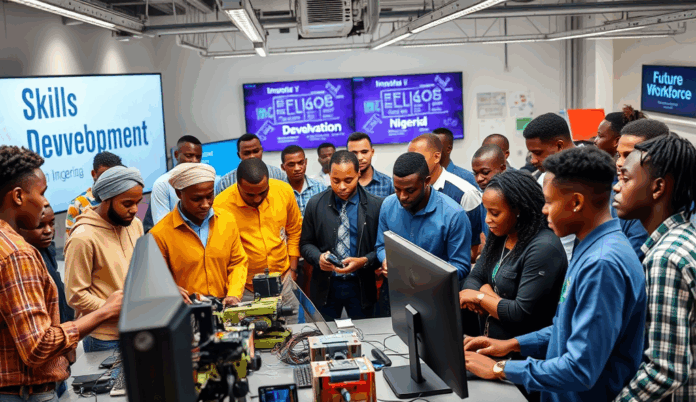Introduction: Understanding the Skills Gap in Nigeria
Nigeria’s skills gap reflects a growing disconnect between university curricula and industry demands, with 56% of employers reporting graduates lack essential technical skills. This mismatch fuels youth unemployment, which stands at 19.6% among those aged 15–24, according to the National Bureau of Statistics.
The digital skills shortage in Nigeria is particularly acute, as only 12% of graduates possess advanced tech competencies needed for roles in fintech and e-commerce. Meanwhile, soft skills like critical thinking and communication remain undervalued in formal education despite being prioritized by employers.
This gap stems from an industry-academia disconnect, where theoretical knowledge outweighs practical vocational training. As we explore the current state of Nigerian graduates, it’s clear that addressing these imbalances requires urgent systemic reforms.
Key Statistics

The Current State of Nigerian University Graduates
Nigeria’s skills gap reflects a growing disconnect between university curricula and industry demands with 56% of employers reporting graduates lack essential technical skills.
Nigerian graduates face a paradox: while 80% complete degrees in fields like social sciences, only 23% meet competency standards for technical roles in sectors like manufacturing and IT, per a 2023 PwC skills report. This workforce skills mismatch in Nigeria leaves industries scrambling to fill positions despite high graduate unemployment rates hovering around 33%.
The education and employment gap manifests starkly in digital sectors, where Lagos startups report spending 6-9 months upskilling hires on basic data analysis and coding. Meanwhile, vocational training needs in Nigeria remain unmet, as only 8% of tertiary institutions offer mandatory internships with industry partners, according to NUC data.
This STEM education deficit creates employability challenges, with fresh graduates earning 40% less than peers who acquired technical certifications alongside degrees. As Nigeria’s economy digitizes, bridging this industry-academia disconnect becomes not just urgent but economically existential.
Why Bridging the Skills Gap is Crucial for Nigeria
The digital skills shortage in Nigeria is particularly acute as only 12% of graduates possess advanced tech competencies needed for roles in fintech and e-commerce.
Nigeria’s projected 4.2% GDP growth in 2024 hinges on closing the workforce skills mismatch, as 73% of employers cite technical skill shortages as their top constraint according to the World Bank. Without intervention, the education and employment gap could cost Nigeria $8 billion annually in lost productivity by 2030, per McKinsey’s labor market analysis.
The digital skills shortage particularly threatens Nigeria’s tech ecosystem, where 60% of fintech startups currently outsource technical roles internationally despite local talent availability. This industry-academia disconnect forces companies like Flutterwave to spend $15,000 per hire on remedial training, draining resources that could fuel innovation.
Bridging this gap would immediately boost graduate employability, as evidenced by Andela Nigeria alumni earning 3.5x the national average salary after acquiring in-demand coding skills. The next section explores which specific technical competencies offer Nigerian students this transformative earning potential.
Top In-Demand Technical Skills for Nigerian Graduates
Nigerian graduates face a paradox: while 80% complete degrees in fields like social sciences only 23% meet competency standards for technical roles in sectors like manufacturing and IT per a 2023 PwC skills report.
Nigerian employers urgently seek graduates with programming skills like Python and JavaScript, as evidenced by 42% of Lagos tech job postings requiring these competencies according to Jobberman’s 2023 report. Cloud computing expertise (AWS/Azure) ranks second, with companies like Paystack paying 40% salary premiums for certified professionals to reduce reliance on foreign talent.
Data analysis skills using Power BI or Tableau are critical, as Nigerian businesses lose ₦500 billion annually from poor data utilization per NBS findings. Similarly, cybersecurity certifications can triple earning potential, given Nigeria’s 37% annual increase in digital fraud cases reported by EFCC.
These technical competencies directly address the workforce skills mismatch, creating pathways to high-growth roles while reducing employers’ $15,000 remedial training costs mentioned earlier. The next section examines how soft skills complement these technical abilities for complete employability.
Essential Soft Skills Needed in the Nigerian Job Market
Nigeria’s projected 4.2% GDP growth in 2024 hinges on closing the workforce skills mismatch as 73% of employers cite technical skill shortages as their top constraint according to the World Bank.
While technical skills like Python and cloud computing open doors, 78% of Nigerian employers prioritize soft skills for career advancement according to a 2023 PwC survey. Communication and teamwork prove critical in Lagos’s collaborative tech hubs, where projects like Flutterwave’s payment integrations require cross-functional coordination among engineers, marketers, and compliance officers.
Problem-solving abilities differentiate candidates, particularly in data-driven roles where NBS reports show employees who propose process improvements earn 25% more. Nigerian graduates at firms like KPMG accelerate promotions by demonstrating analytical thinking during client presentations and audit engagements.
Adaptability remains Nigeria’s most sought-after soft skill as industries digitize, with Jobberman noting 63% of employers value professionals who continuously upskill. These interpersonal competencies complement the technical proficiencies discussed earlier, creating truly employable graduates ready for Nigeria’s evolving digital economy.
The Role of Digital Literacy in Closing the Skills Gap
While technical skills like Python and cloud computing open doors 78% of Nigerian employers prioritize soft skills for career advancement according to a 2023 PwC survey.
Digital literacy has become Nigeria’s silent equalizer, with a 2022 NBS report showing digitally proficient graduates earn 40% more than peers lacking these competencies. From navigating enterprise software at banks like GTBank to leveraging data visualization tools in agriculture startups like Farmcrowdy, basic tech fluency now underpins success across all sectors.
The digital skills shortage in Nigeria persists despite growing demand, as only 32% of graduates demonstrate proficiency in tools like Excel or collaborative platforms according to Jobberman. Bridging this gap requires targeted training, exemplified by Andela’s digital upskilling programs that have placed 5,000 Nigerians in tech roles since 2018.
As industries digitize, adaptability with emerging technologies complements the soft skills previously discussed, creating well-rounded professionals. This foundation prepares graduates for the industry-specific competencies we’ll explore next across Nigeria’s key economic sectors.
Industry-Specific Skills Required in Key Sectors
Nigeria’s banking sector demands expertise in fintech solutions like Flutterwave’s payment APIs and risk analysis tools, with 68% of financial institutions prioritizing these skills according to a 2023 EFInA survey. Healthcare graduates need proficiency in telemedicine platforms and EHR systems, as demonstrated by Helium Health’s digital transformation of 500 Nigerian hospitals.
Agriculture professionals require precision farming techniques and agri-tech tools like Hello Tractor’s IoT solutions, which have boosted yields by 30% for 50,000 Nigerian farmers. Meanwhile, construction firms seek BIM software mastery, with Julius Berger reporting 25% efficiency gains from digitally skilled teams.
These sector-specific competencies build on the foundational digital literacy discussed earlier, creating a skills matrix that universities must address. The next section explores how academic institutions can align curricula with these evolving industry needs to reduce Nigeria’s education and employment gap.
How Nigerian Universities Can Adapt to Meet Skill Demands
Nigerian universities must revamp curricula to integrate sector-specific digital tools like Flutterwave’s APIs and Helium Health’s EHR systems, aligning with the 68% of financial institutions and healthcare providers demanding these competencies. Partnerships with industry leaders such as Hello Tractor and Julius Berger can provide hands-on training in agri-tech and BIM software, bridging the education and employment gap.
Academic institutions should establish innovation hubs modeled after Lagos Business School’s enterprise development center, offering certifications in high-demand areas like fintech and precision farming. These hubs can leverage Nigeria’s growing tech ecosystem, ensuring graduates acquire practical skills that match employer needs, as seen in Helium Health’s hospital digitization projects.
Faculty development programs are critical to equip lecturers with emerging technologies, enabling them to teach relevant courses like IoT for agriculture or telemedicine platforms. By adopting Germany’s dual education model, Nigerian universities can combine classroom learning with apprenticeships, preparing students for the workforce skills mismatch highlighted in earlier sections.
The next segment explores actionable steps students can take to master these competencies independently.
Practical Steps for Students to Acquire In-Demand Skills
Students should proactively enroll in certification programs like Flutterwave’s developer courses or Helium Health’s digital health training to gain hands-on experience with tools demanded by 68% of employers. Platforms like Coursera and Udemy offer localized courses in fintech and agri-tech, addressing Nigeria’s digital skills shortage while complementing classroom learning.
Seek internships with industry partners such as Hello Tractor or Julius Berger to apply theoretical knowledge in real-world projects, bridging the workforce skills mismatch. Joining innovation hubs like Lagos Business School’s enterprise center can provide access to mentorship and practical training in high-growth sectors like precision farming and telemedicine.
Leverage free resources from Nigeria’s tech ecosystem, including open-source APIs and developer communities, to build portfolios showcasing competency in IoT or BIM software. By combining self-directed learning with industry collaborations, students can overcome employability challenges even before curricular reforms take full effect.
Conclusion: The Way Forward for Nigerian Graduates
Nigerian graduates must proactively address the skills gap by combining technical expertise with soft skills, as highlighted by the 2023 Jobberman report showing 58% of employers prioritize adaptability. Initiatives like Andela’s tech training and Lagos State’s employability programs demonstrate how targeted upskilling can align education with industry needs.
The workforce skills mismatch in Nigeria demands continuous learning through platforms like Coursera and local hubs such as Co-Creation Hub. Graduates should leverage Nigeria’s growing digital economy, where 40% of new jobs require hybrid skills in tech and problem-solving, according to PwC’s 2023 outlook.
Bridging the education and employment gap requires collaboration between universities, policymakers, and private sectors to scale vocational training and STEM education. By embracing these strategies, Nigerian graduates can turn employability challenges into opportunities in sectors like fintech and renewable energy.
Frequently Asked Questions
How can I learn Python and JavaScript without prior coding experience?
Start with free platforms like Codecademy or freeCodeCamp which offer beginner-friendly Nigerian-focused coding tutorials.
What soft skills should I prioritize to stand out in Nigeria's job market?
Focus on communication and problem-solving – join Toastmasters clubs and practice case studies from platforms like PrepMyCareer Nigeria.
Can I get industry-relevant skills while still in university?
Yes – enroll in Google Africa Developer Scholarships or Andela Learning Community for free tech courses with industry certification.
How do I gain practical experience if my university lacks internship programs?
Volunteer for tech startups via platforms like NGVolunteers or build projects using open APIs from Nigerian fintechs like Paystack.
What's the fastest way to bridge the digital skills gap as a graduate?
Take intensive 3-month bootcamps like Decagon Institute or Semicolon Africa that combine technical training with job placement.


